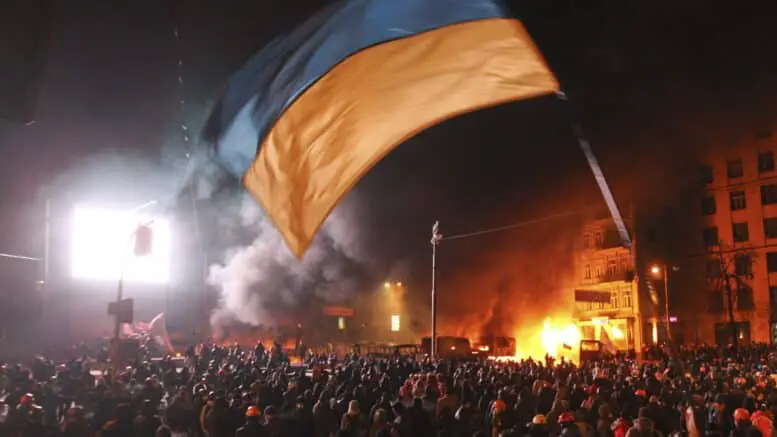An agreement was brokered by EU leaders between Ukraine’s ruling party and the opposition. That agreement, however, was broken the day after it was signed as the opposition impeached Viktor Yanukovych and moved to consolidate power. Here are twelve points you should know as the country goes forward.
- Transition and New Elections. A transitional government has taken over. Executive powers are now held by the new speaker of the parliament, Oleksandr Turchynov, a member of Tymoshenko’s Fatherland party. Arseny Yatsiniuk, also of Fatherland, was appointed Prime Minister by parliament. New presidential elections will take place on May 25, 2014.
- A New, Old Constitution. Ukraine has returned to the 2004 constitution – which gave Ukraine a strong parliament and a weak president. This constitution had been criticized by many political commentators on both sides of the divide as problematic and one of the main source of the gridlock that characterized Ukrainian politics after the Orange Revolution. The return does strip amendments, however, enacted by Yanukovych that greatly strengthened the presidency. It may be seen as a reset with additional amendments to follow.
- Law and Order. The Interior Minister (under whose purview the police forces come under) is dismissed. The new Interior Minister is is Arsen Avakov, a member of Tymoshenko’s Fatherland party. Ukraine’s parliament has voted itself the power to appoint and dismiss judges. Vitali Klitchko and Oleh Tyahnibok, two of the major protest leaders, are favoring lustration to clear out forces loyal to the old regime. The Berkut riot police, blamed for somee of the violence at the protests, has been disbanded.
- Unity in the Legislature. All of this was done with large majorities of Ukraine’s legislature voting for it – indicating that elected officials, at least, are united behind it. Russia has not expressed support for the changes currently taking place and has stated that any shift in the constitution should be decided by national referendum.
- Deep Social Divisions Remain. Ukraine remains a very divided country – politically, culturally, linguistically, religiously, and ethnically. There is a push, lead by Ukraine’s eastern districts and Crimea to try to institute a greater amount of federalism in Ukraine, giving individual regions more power to govern locally and finance local projects. Russia supports this measure. The parliament’s recent decision to strike down a 2012 bill that allowed regions to name additional official languages for local use is likely to inflame tensions again between Ukrainian and Russian speakers. Ukrainian is again the single official language of Ukraine.
- The Nationalists are Stronger. The ultra-nationalist Right Sector movement, which helped lead much of the violence, has stated that they do not trust the deal and will keep fighting. The movement is seen as having been pivotal to the success of the protests, but also as one of the greatest internal threats to the new government. Although Right Sector is not a political party and was not part of the official opposition, they are now represented in Ukraine’s government. For instance, Dmytro Yarosh, the group’s leader, is now serving on Ukraine’s Security Council.
- The Separatists are Stronger. Crimean separatism was re-inflamed by the recent events. Before the current crisis started, the speaker of Crimea’s parliament stated that he did not recognize the laws passed by the current Ukrainian parliament. Crimea’s parliment has officially recognized Yanukovych as President of Ukraine. Protestors supporting each side of the conflict clashed in the streets. Later, the Crimean parliament building, airports, and other infrastructure, particularly military, was taken over by well-armed men bearing no military insignia on their uniforms. Russia says that these are Crimean self-defense units, although many analysts have argued that they must be Russian. Russia has reinforced their military base in Sevastopol with men and equipment and ran military exercises in western Russia. While such exercises are strategically understandable given the possibility that the Ukrainian crisis might have deteriorated into civil war, and Russia shares a long border with Ukraine that would have been affected by that war, the military movement is causing international concern.
- Economic Problems Remain. Ukraine remains a very indebted country – it is now, more than ever, on the verge of financial collapse. It needs massive amounts of aid, investment, and reform to become economically viable again. The EU promised up to $27 billion in aid, but has so far formally offered $15 billion in loans, grants, and other aid. However, the EU will demand specific economic reforms expected of countries that intend to integrate with the EU. Russia has said that the remaining $12 billion of an intended $15 billion aid package Russia promised can still be released, without requirements, if a new “legitimate” government is put in place. The US has pledged $1 billion. The new government has stated that it will need at least $35 billion to remain functioning.
- Tymoshenko and the Fatherland Party. The Fatherland Party has emerged in the current situation as main winner. It’s leader, Yulia Tymoshenko has been freed from prison. She addressed cheering crowds at Maidan and spoke to German Chancellor Angela Merkel and US conservative John McCain by phone. Given her triumphant release and her wide appeal inside and outside of Ukraine, she will likely fare well in the next presidential elections, in which she has stated she will participate. The Kiev prosecutor’s office, however, has said that it will file charges against her for the murder of businessman that occurred in the 1990s.
- Victor Yanukovych. Yanukovych has been impeached, accused of human rights abuses, and declared “unable to carry out his duties” by the parliament, despite the fact that the deal signed to end the political crisis would have kept Yanukovych in power until new elections could be held. The impeachment vote, however, was unanimous. Yanukovych has responded by saying that he is the “legitimately elected president” and that he will not resign and will keep fighting. Protestors who stormed his sprawling estate outside of Kiev claim that found partially burned documents and several files floating in a nearby river that implicate him in bribery and fraud. His current location is unknown. An arrest warrant has been issued for him in connection with the deaths on Maidan. He has been granted refuge in Russia.
- Party of Regions and The Ukrainian Front. The events seem to have badly damaged the Party of Regions, Yanukovych’s ruling party. Yanukovych’s standing within the party seems to have fallen badly as well. Several powerful members have left the party. Several others have formed a new “Progressive” faction within the party. Whether the Party of Regions will continue to be as powerful a party as it has been is in question. A new movement, based in Ukraine’s eastern regions, called “The Ukrainian Front” has formed with many Party of Regions members joining. The Front considers the changes enacted by the current parliament to be unconstitutional and are the main organization behind calls for a federalist structure to be implemented in Ukraine. The Front could, in the future, form a replacement to the damaged Party of Regions, or could be an attempt to reform and support the party from a new platform.
- International Concerns. For more on how the current Crimea crisis might play out with the participation of the US, EU, and Russia, see our article Resolving the Crimea Crisis and our Crimea Crisis Reader.



